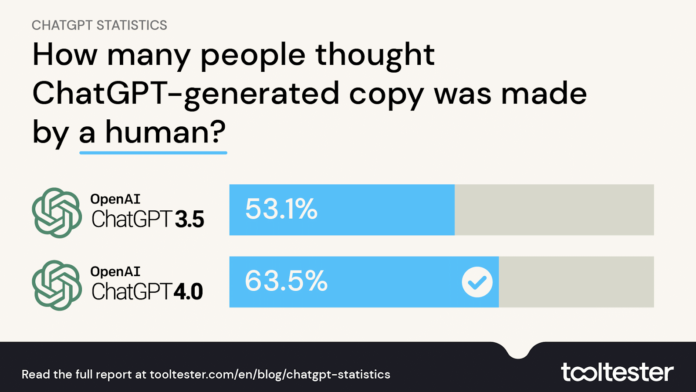In news sure to crush the souls of writers everywhere, it seems that ChatGPT and other artificial intelligence tools write just as well as humans do—at least, to a level that the average American adult finds indistinguishable.
The results come from a survey conducted by ToolTester(Opens in a new window), a site for finding the best web builders, hosts, and e-commerce tools. It performed two surveys—the first in late February 2023 of 1,920 American adults that compared 75 pieces of text either generated by AI, by humans, or by AIs and edited by humans. The AI used was ChatGPT powered by GPT-3.5, but after the launch of GPT-4, ToolTester surveyed another 1,394 people in late March with the same queries and topics, but with new AI-generated copy using the same prompts.
Over half the respondents thought ChatGPT-3.5’s copy was written by a human. That number rose to 63.5% using GPT-4. The results show that GPT-4 (used in the pay version of ChatGPT) is at least 16.5% more convincing than copy created with the older GPT-3.5.
The AI copy can be harder to detect depending on the type of writing. For example, health-related articles generated by AI are the best at duping people into thinking humans wrote them. This table shows percentages of people who believe ChatGPT-generated text is from an AI, a human, or an AI edited by a human.
The percentage of people who believe AI writing is made by AI or human.
(Credit: ToolTester)
The more familiar people are with using AI tools, the less likely they are to be fooled. Even so, they’re misled 48% of the time. For those who say they have never used a generative AI tool, the average ability to identify AI writing drops to 40.8%.
The wisdom that comes with age also helps. Those aged 65 and older are the most likely to correctly ID AI-generated content, whereas 18- to 24-year-olds are more likely to believe AI writing is human-generated.
Recommended by Our Editors
Ultimately it comes down to trust for content publishers such as PCMag.com and others. (For example, The Guardian is currently dealing with fake article attribution in ChatGPT(Opens in a new window).) We live and die by the faith readers have in our content—and most people don’t want publishers to abuse that. Of survey respondents, 71.3% will not trust a publisher who uses AI content without full disclosure, and 80.5% believe AI disclosures should be the norm.
For more insights into this information, read the full report at ToolTester(Opens in a new window).
 This AI robot was made to be your best friend
This AI robot was made to be your best friend
Get Our Best Stories!
Sign up for What’s New Now to get our top stories delivered to your inbox every morning.
This newsletter may contain advertising, deals, or affiliate links. Subscribing to a newsletter indicates your consent to our Terms of Use and Privacy Policy. You may unsubscribe from the newsletters at any time.
Hits: 1

















